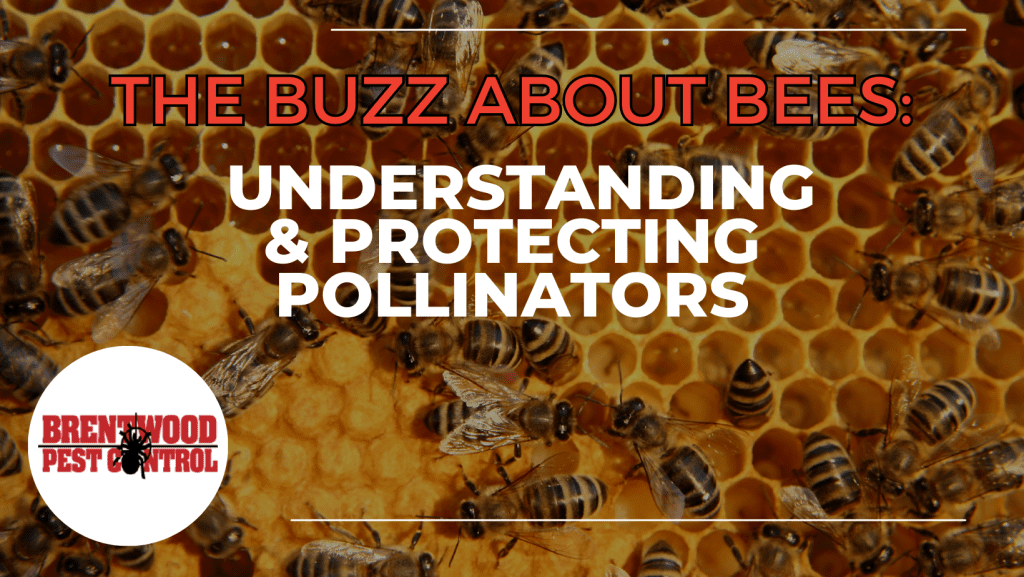
In the lush landscapes of Brentwood, bees play a crucial role in the delicate balance of the ecosystem. However, these essential pollinators are facing increasing threats from various human activities. At Brentwood Pest Control, we recognize the importance of coexisting with these vital insects while ensuring a pest-free home. In this blog post, we’ll delve into the significance of bees in Brentwood’s ecosystem, the challenges they face, and practical steps for protecting them and your home.
The Plight of Brentwood’s Bees
Bees, including honeybees and various wild species, are facing multiple challenges that put their populations at risk. Habitat loss, intensive farming practices, changes in weather patterns, and the excessive use of agrochemicals like pesticides are among the factors contributing to the global decline in bee populations. Even in Brentwood’s seemingly idyllic environment, these issues have a significant impact.
Air pollution adds another layer of threat to Brentwood’s bees. Research suggests that air pollutants interact with scent molecules released by plants, disrupting the bees’ ability to forage efficiently. This interference makes bees slower and less effective at pollination, posing a potential threat to the diverse flora crucial for human well-being.
While honeybees are well-known for their role in pollinating crops like fruits and vegetables, native pollinators, including various bee species, butterflies, flies, and hummingbirds, also contribute significantly to pollination in Brentwood. Protecting these pollinators is not only vital for maintaining biodiversity but also essential for the livelihoods of local apiculturists.
Pesticides and Bee Decline: The Neonicotinoid Connection
In Brentwood, as in many other places, the decline in bee populations has been a cause for concern. This phenomenon, often referred to as honeybee decline or colony collapse disorder, has been attributed to a combination of factors. These include parasites, diseases, low genetic diversity, poor nutrition, loss of habitat, management stress, and the excessive use of pesticides.
Of particular concern are neonicotinoid insecticides, a widely used class of pesticides. Neonicotinoids, with active ingredients like acetamiprid, clothianidin, dinotefuran, imidacloprid, or thiamethoxam, were introduced in the mid-1990s. While considered a less toxic alternative to older pesticides, neonicotinoids pose a threat to pollinators due to their persistence and systemic nature.
Neonicotinoids are absorbed by plant roots and move throughout the entire plant, including pollen and nectar. This systemic property exposes bees to pesticides during foraging, affecting their health and potentially contributing to colony collapse. The U.S. Environmental Protection Agency (EPA) has introduced label changes for neonicotinoid-containing insecticides, including a bee icon in the Environmental Hazards section and specific instructions to protect bees.
Protecting Brentwood’s Bees: Tips for Home Gardeners
At Brentwood Pest Control, we emphasize the importance of responsible pesticide use to safeguard pollinators. Home gardeners in Brentwood can take specific steps to protect bees while ensuring their gardens thrive:
1. Avoid Treating Blooming Plants: Refrain from treating crops or flowering plants, and never spray open flowers. This ensures bees are not directly exposed to pesticides during their foraging activities.
2. Use the Least Toxic Pesticide: Choose pesticides with low impact and risk to pollinators. Understand that even organic pesticides can be harmful, and different formulations may vary in toxicity. Read and follow all instructions on the pesticide label regarding toxicity to bees.
3. Adjust Applications Based on Weather: Be mindful of weather conditions when applying pesticides. Apply them during optimal drying conditions to limit the time of direct exposure to bees. Be aware of temperature variations that can affect the residual activity of pesticides.
4. Know and Communicate with Beekeepers: Familiarize yourself with state regulations regarding pollinator protection. If you know of nearby bee colonies, contact beekeepers before pesticide applications to prevent potential harm.
Attracting Bees Responsibly: Tips for a Bee-Friendly Garden
While being cautious about pesticides, you can actively contribute to bee conservation by creating a bee-friendly garden:
1. Select Plants for Pollen and Nectar: Choose plants that provide essential pollen and nectar for bees. Native plants and wildflowers are often excellent choices, as they offer diverse and balanced nutrition.
2. Consider Colors and Shapes: Bees are attracted to blue, purple, and yellow flowers. Opt for a variety of colors and shapes, ensuring a mix of flat or shallow blossoms that are accessible to a honeybee’s tongue.
3. Plant in Groups: Create clusters of plants to make it easier for bees to find and visit many flowers in one location. This increases the efficiency of their foraging and enhances the pollination process.
4. Ensure Blooms All Season: Aim for a garden with blooms from early spring to late fall to support active bees throughout the seasons.
Coexisting with Brentwood’s Bees: Practical Steps
Beyond the garden, coexisting with bees in Brentwood involves some practical steps:
1. Safeguard Your Food and Trash: Bees are attracted to sweet smells, so cover your food and dispose of trash promptly to avoid drawing their attention.
2. Choose Scents Wisely: Limit sweet-scented perfumes and lotions when spending time outdoors, as these can attract bees.
3. Dress Appropriately: Opt for muted colors and simple patterns in clothing to reduce the chances of attracting bees.
4. Manage Bee Habitats Responsibly: If you encounter bee hives or nests on your property, handle them responsibly to avoid attracting bees inside your home.
5. Seek Professional Help if Needed: If bees have entered your home, enlist the help of professionals who can safely remove them without causing harm. This ensures a balance between protecting your home and respecting the vital role of bees.
In conclusion, understanding and protecting Brentwood’s pollinators, especially bees, is a shared responsibility. By adopting responsible pesticide practices, creating bee-friendly gardens, and taking practical steps to coexist, we can contribute to these essential insects’ well-being and our ecosystem’s health. At Brentwood Pest Control, we are committed to promoting sustainable pest control practices that prioritize the harmony between human habitats and the natural world. Please visit our website or call Brentwood Pest Control at (615) 417-1243 if you need more information or pest support.
